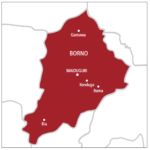The United Nations Mine Action Service (UNMAS), on Thursday said explosive remnants of (war) of the Boko Haram conflict might have killed about 565 persons in the North-east in 2018.
Lionel Pechera, UNMAS Programme Coordinator, disclosed this during a campaign to mark the International Day for Mine Awareness and Assistance in Mine Action in Maiduguri.
He lamented that the presence of explosive hazards was a barrier to accessing the majority of land for agriculture activities, which in turn increased food insecurity in the area.
Pechera also said that some of the displaced areas were highly contaminated by explosives, indiscriminately, injuring, maiming and killing civilians.
Pochera, who said that the figure were believed to represent only a portion of the actual number of incidents, noted that a large part of the territories in the Northeast were inaccessible.
He said that the campaign became imperative to protect life and property as well as support the voluntary return of the IDPs to their homes.
Pochera said that the long term impact of such threat could jeopardise effort of the Nigerian government and the humanitarian actors to return IDPs to their librated communities.
“In line with the Protection Strategy of the Nigeria Humanitarian Country Team, there is a need for expansion of humanitarian mine action operations.
“This is to enable safe return of refugees and IDPs and freedom of movement of individuals for delivery of humanitarian assistance.
“UNMAS’ effort is to enhance existing national capacity by providing targeted training for frontline policing service in the Nort-heast Nigeria.
“In this context, the UNMAS and Danish Demining Group and the Advisory Group are currently engaged in reducing the impact of explosive hazards.
“This is primarily done through conducting risk education sessions for the civilian communities and humanitarian actors in the region.
“In the absence of large scale decontamination campaign, because of the conflict, risk education sessions are proving to be critical in mitigating the risk of injury.
“This is through the adoption of safe behaviour in explosive hazards communities,’ he said.
He, who noted that available resources for UNMAS for mine action in the northeast were not sufficient to scale up its emergency response, urged stakeholders to support funds mobilisation for the programme.
Speaking earlier, Mohammed Mustapha, the NEMA Disaster Risk Reduction Officer, said land mines and remnant explosives of war killed as many as 15,000 people every year, globally.
Mustapha lamented that many explosives that had not exploded were left untriggered, posing serious risk to the civilian population.
He said that the campaign would go a long way in protecting the newly returning populace and others that were yet to return. (NAN)

 Join Daily Trust WhatsApp Community For Quick Access To News and Happenings Around You.
Join Daily Trust WhatsApp Community For Quick Access To News and Happenings Around You.


